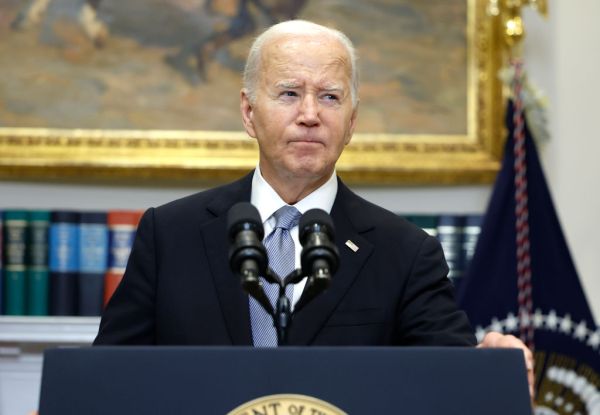Hello and happy Saturday. One of our favorite activities when our kids still enjoyed hanging out with us was to go to King’s Island, a big amusement park about 20 minutes away from the Ohio bureau. Great rides, a decent water park, and this awful blue soft-serve ice cream that somehow tastes worse than it looks but kids love it.
I know what you’re thinking: “She’s gonna make a roller coaster analogy, isn’t she?” Nope. I burned that one two weeks ago. But close. At King’s Island, right next to the Banshee—an amazing coaster where you are buckled into seats suspended from the track and flip upside down about seven times—sits a ride called Delirium. A circular platform hangs from a pendulum, and riders sit around the platform facing outward. The platform spins you around while the pendulum swings higher and higher, and I don’t recommend riding it with a belly full of blue ice cream. That is the analogy that best sums up the last week.
We woke up exactly one month ago facing the prospect of a presidential election between two elderly men with negative approval ratings and immense … baggage, to be concise. If not for a fortuitous head turn by former President Donald Trump at precisely the right moment during a campaign speech, neither man would be running for president today.
President Joe Biden’s disastrous debate performance on June 27 showed Democrats that they were likely headed toward defeat in November. As his polling numbers dropped precipitously, calls for him to step aside went from whispers and media leaks to vocal and on the record. Then, just when it seemed inevitable that Biden would have to withdraw, a gunman very nearly assassinated Trump at a rally in Pennsylvania. Calls for Biden to step aside quieted as he spoke out in the days following to denounce political violence and address the massive security failure at Trump’s rally, and Democrats seemed resigned to their fate.
Two days later, raucous cheers greeted Donald Trump as he walked into the Fiserv Forum in Milwaukee, setting off a buoyant and almost joyful (but definitely a little weird) Republican National Convention. The Republican Party, divided since Trump’s takeover in 2016, projected strength and unity while the Democrats floundered in disarray.
And then a funny thing happened. More Democrats issued statements asking Biden to withdraw. The president was diagnosed with COVID-19 on a campaign trip to Las Vegas and returned home to Delaware. Whether it was the public calls for him to quit the race, precipitous declines in polling, and/or flagging fundraising, the president decided that continuing his campaign was not in the best interest of his party. On Sunday afternoon, he announced his withdrawal in a letter his campaign posted to X, formerly Twitter. In a follow-up statement, he endorsed Vice President Kamala Harris.
Immediately after the debate last month, a big question complicated the “should Biden withdraw” debate: If not Biden, who? Skipping over Harris would be awkward, but she suffered from low approval ratings and had few notable accomplishments in the last three years. Had Biden dropped out then, we don’t know what the Democrats would have done. But with Biden waiting weeks to act, time was running out before next month’s Democratic National Convention. By Monday, Democrats—elected and otherwise—were lining up behind Harris. Endorsements poured in, and so did the cash. Biden dropped out early Sunday afternoon and, as Dispatch Politics reported, Harris had raised nearly $50 million by 5 a.m. Monday: “The vice president also has the advantage of essentially assuming command of a sprawling Biden campaign apparatus that includes hundreds of offices and paid staff in the battleground states that will decide the election.”
Talk about a remarkable turn of events. Just days after Republicans concluded their boisterous convention as Trump and his vice presidential nominee J.D. Vance hit the campaign trail, the Democrats completely flipped the script on the race. Trump had been leading Biden by 3.1 points in the RealClearPolitics polling average; he now leads Harris by only 1.7. As Chris Stirewalt wrote in his newsletter this morning, she’s closing the gap in swing states, too.
In Friday’s Dispatch Politics, the team (which really deserves a day off!) wrote:
The vice president has revitalized a Democratic electorate—elite, grassroots, and otherwise—that was resigned to a Trump victory and turning its attention to down-ticket contests. Party sources tell us she is agile in a way Biden, even at his best, was not. Harris’ youth and agility as a public speaker, they say, equip her to counter the asymmetrical attacks from Trump that often flummox his opponents, while simultaneously able to go on the offensive with a future-oriented message that can make a credible case to voters that she is the “change” candidate.
The enthusiasm for Harris seems to be genuine, but of course, it’s early. And the scrutiny will come in hot and heavy given the truncated campaign. That so many people endorsed Harris so quickly is a unifying gesture but only masks the fact that the Democratic Party has its own divisions. One line she will have to tread carefully is that between those on the far left who support the Palestinian cause and have protested Israel’s actions in Gaza, and Jewish Democrats. Harris has been more critical of Israel than President Biden and, as Drucker wrote, she made sympathetic statements about the anti-Israel protests that roiled college campuses last spring. She also skipped Israeli Prime Minister Benjamin Netanyahu’s address to Congress on Wednesday even though vice presidents typically preside over such joint sessions (though she did meet with Netanyahu on Thursday). “Until now, she has been the Biden administration’s ambassador to the progressives, trying to mute Biden’s strong support for Israel. If she’s going to have the strong support of Jewish voters and donors, she needs to change course,” one Jewish Democrat told Drucker.
Israel is hardly the only issue on which Harris sits to the left of Biden, and as much as the Democratic base has lined up behind her, she’ll need support from a broader spectrum of voters to win. John compiled a list of issues where her progressive stances threaten to trip her up: Harris co-sponsored Sen. Bernie Sanders’ Medicare for All legislation and the Green New Deal bill put forth by Rep. Alexandria Ocasio-Cortez and Sen. Ed Markey. She has said she “would not rule out expanding the Supreme Court” and vowed to use executive orders to implement gun control measures. John also looked at her record on immigration, abortion, and criminal justice, concluding, “While it’s unclear which aspects of her record Harris seeks to emphasize, downplay, or abandon, how she handles these questions between now and when voters begin heading to the polls could very well determine the outcome of the election.”
Conveniently for Harris, Kevin has some advice for her on these exact issues. (He had previously advised her to withdraw alongside Biden and run for governor of California or—if she really wanted to be president, start out leading a university rather than the nation, so we’ll see.) He suggests she get serious about illegal immigration, tone down her messaging on abortion, and remind voters that gun control is Congress’ job, not the president’s.
Harris will face plenty of legitimate skepticism over the next 100 days before November 5, but—our politics being what they are—we’ve also seen criticism that speeds right past “unfair” on its way to “ewww, gross.” I’ll leave out the more prurient stuff, but some Harris opponents have called attention to the fact that she never had children (though she is a stepmother to husband Doug Emhoff’s two children). One of those opponents is none other than J.D. Vance, Trump’s running mate.
Back in 2021, while running for Senate, Vance told a crowd that Democrats are “a bunch of childless cat ladies who are miserable at their own lives and the choices that they’ve made and so they want to make the rest of the country miserable, too”—and he name-checked Harris, AOC, and, for good measure, Transportation Secretary Pete Buttigieg.
Nick wrote in Boiling Frogs that Vance’s attitude toward the childless is a product of his nationalist tendencies and reflects the New Right’s anti-immigration stance and overall tribalism:
Many populists accuse Democrats of a plot to replace “real Americans” with third-worlders en masse in order to remake the country demographically. That leaves them in a race of sorts with the usurpers to establish control of the United States, and that race can’t be won by securing the southern border alone. The enemy will need to be outbred as well, and the childless among us aren’t pulling their weight.
It’s a sizzler, so be sure to read the whole thing. But there is so much else on the site this week that I haven’t been able to mention: Kevin finally got to write a big summary of the National Conservatism conference that he covered a few weeks ago, and Jonah reminded everyone that it’s not the job of the media to carry water for a party or candidate (though he understands why people have that impression). And the world didn’t stop just to watch the political drama unfolding in the U.S.: Charlotte reports on Israel’s response to the drone attack on Tel Aviv that hit a building close to the U.S. Embassy branch, and Jonathan Ruhe writes about Secretary of State Antony Blinken’s statement that, whoops, Iran is actually super close to having a nuclear weapon. I’m way behind on my podcasts, but Sarah and David discuss some of the legal issues around Harris taking over the Biden campaign on Advisory Opinions, Jamie interviews Eliot Cohen on The Dispatch Podcast about what Trump’s foreign policy might look like in a second term, and you shouldn’t miss Jonah and Steve shooting the breeze on The Remnant.
I’m going to close with a reference to this week’s Capitolism, in which Scott took a break from critiquing tariffs and central planning and discussed how impressed he was that Americans—and the financial markets!—have seemingly taken the upheaval of the last month in stride. “My, what a year the last few weeks have been,” he starts, before reminding readers that the president and federal government don’t actually influence the economy or the markets that much. “Bad policy and bad government actors can hurt the U.S. economy, but they very likely can’t kill it—and we should always remember and be thankful for that, while also always striving for better. … Now, if you’ll excuse me I have a baseball game to watch.”







Please note that we at The Dispatch hold ourselves, our work, and our commenters to a higher standard than other places on the internet. We welcome comments that foster genuine debate or discussion—including comments critical of us or our work—but responses that include ad hominem attacks on fellow Dispatch members or are intended to stoke fear and anger may be moderated.
With your membership, you only have the ability to comment on The Morning Dispatch articles. Consider upgrading to join the conversation everywhere.